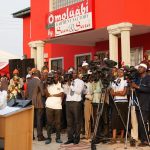
'Two Festivals Of A Kind' – Rare Moments From The Osun Osogbo Festival

Governor State of Osun, Ogbeni Rauf Aregbesola acknowledging cheers,
during the 2013 Osun Osogbo Festival, at Osogbo,OSUN State
A stage bedecked with the Union Jack and the map of Nigeria inset, the be-whiskered matchmaker himself, Lord Lugard, who presided over the union of the various ethnicities take his turn, played to the hilt by Paul Alumona, though without the luxurious walrus. Other historical figures follow, Sardauna of Sokoto, brilliantly portrayed by Austine Onuoha, Obafemi Awolowo, brought alive on stage by Babatunde Adeniyi and of course Nnamdi Azikiwe (Paul Alumona).
Though no military leader was represented by name or anything close to it, the series of coups, counter coups and take-over so fluidly enacted by the actors left the audience in no doubt as to the part they played in the country’s history. In a ragtag formation and even less coordinated professionally, the officers edge out one another in a series of putsches, ostensibly to better the lot of the citizens but in reality to help themselves.
Eliciting much laughter, it is the director’s way of depicting them as a huge joke. Nigeria itself has been a huge joke ever since its birth as a nation. Ethnicity is as rife as it was five decades ago; corruption and mediocrity have grown correspondingly. Add to that religious intolerance and terrorism and you understand fully the combustible mix presented by the actors, sometimes through tense and funny dialogue, and mostly through celebratory dance steps or mournful shuffles. No period is left untouched in a broad historical sweep: pre-Independence, Independence, regional politics post-Independence, the civil war and its aftermath to the present day. Even Fela gets his turn on stage – to great applause from the audience.
Thus for two hours late that night was an assorted mix of politicians and diplomats, bureaucrats and culture enthusiasts, high society types in the State of Osun and visitors from without sat transfixed as the actors transported them through nearly a century of Nigeria’s history – through the lens of poet and scholar, Odia Ofeimun and realised through the directorial concept of Felix Okolo, a man he calls “my director for all seasons.” Governor Rauf Adesoji Aregbesola himself sat close to the orchestra, his head angled all through to his left watching the traffic on stage keenly.
The ambassador of France sat next to him. The head of service of the State of Osun was not far away. Commissioners and members of the House of Assembly were scattered around in the hall, plus a sprinkling of chiefs and their spouses. Long before curtains up, sumptuous dishes were ferried from table to table for guests. Food and drinks are not allowed in live theaters. But the day was also a dinner for trade and investment partners from the U.S. Having them watch Nigeria the Beautiful while dining and wining at the same time was certainly novel for a performance.
The dancers maximised available space, thanks to the dexterousness of the choreographer. A director, dramatist and choreographer, Yomi Duro-Ladipo, son of the legendary film maker, Duro Ladipo, gave Okolo kudos. “Nigeria the Beautiful is a good concept and well directed. The artistes acted well. Generally, this is a good production.” Good words to a colleague. But for sheer spectacle, Okolo is the one to beat as a director.
And yet, Nigeria the Beautiful isn’t all about spectacle despite the dozens of musical intermissions. As interpreted by Okolo, Nigeria the Beautiful is really about unity, the fullness of it in all the diversity the country represents. For in the words of the last major historical character to appear on stage, Goodluck Jonathan, “We shall build Nigeria the beautiful/ Creek and Forest/ Savannah and Sahel, Lagoon and Delta to the Plateaus/ Cross River to Lake Chad: ‘tis a duty that we owe/ To build the country beautiful, lift Africa, and unite the world; / It’s not life that matters but the goodness we bring to it.”
A week before, Osogbo town had been full of life, the goodness of it, if you like. An ordinarily serene and provincial capital, it comes alive every August when the Yoruba and those in the Diaspora converge at the famous grove in the state capital for spiritual reunion. Worshippers of the Osun/ Osogbo priestess come from far and near, seeking solution to their problems, physical or spiritual. Some others, including tourists, come for the spectacle it represents.
Friday, August 23 was the grand finale of the week-long festival. In Lagos on Sunday, August 18, there was a Goddess Concert at Eko Hotel & Suites, Victoria Island, where Asa, Dare Art-Alade, Gloria Ibru and Waje performed. According to Olatunbosun Soyode, Special Adviser on Tourism and Culture to Ogbeni Aregbesola, the concert was to appeal to younger people who might be turned off from what some of them consider a fetish festival. “If you want the younger people to be interested in your culture and heritage, you have to take it to them. The Goddess concert was to arouse their interest to come to Osogbo for the festival proper.”
If that was the sole purpose of the concert in Lagos, it was a success beyond their wildest imagination. You could feel the vibe all around. It was as if the town had more than doubled in population.
Hotels were booked in advance, bars spilled to streets and electric poles decorated with posters of Seaman’s Aromatic Schnapps. Yellow-striped blue buses popularly called koregbe zipped around the town stopping for passengers and disgorging them. Devotees dressed in white down to their shoes found their way to the grove. Buses with white banners and OPC logos were practically everywhere. The festive air was infectious, the bond between worshippers and goddess strong.
In the words of Oyintiloye Olatubosun, Assistant Director Bureau of Communications and Strategy in the Office of the Governor, “the Osun Osogbo annual international festival is a celebration of culture and fulfilment of the pledge between a people and a goddess.”
The girl/ goddess (Arugba) in question was the centre of attraction that weekend. Early on Friday at the palace, the 12-year-old had being spiritually sanctified before embarking on her odyssey from there through the town to the grove. Her predecessor was carrier for 10 years. She could be carrier for as long or even longer.
For a festival attracting devotees from all over the world – the Venezuelan and Cuban ambassadors were in town, not to mention the hundreds of Orisha worshippers from Brazil – it was not always so. It got its international imprimatur thanks to the pioneering and untiring effort of Susanne Wenger, an Austrian woman and devotee of the goddess, who died and was buried in Osogbo.
After the watching Nigeria the Beautiful at Government House, an elated Aregbesola declared: “This is the best way we know how to entertain our guests.”
The following day before the commencement of the festival at the grove and wearing white from cap to his footwear, he extolled the importance of the festival. “In celebrating this prominent festival, we must not forget what it connotes.
We must continue to imbibe and deepen the non-material values of this socio-cultural engagement. Courage, sacrifice, selflessness, brotherliness, hope and faithfulness remain some of the major values under-girding the celebration of Osun Osogbo festival.”
– adapted from THISDAY NEWSPAPER



